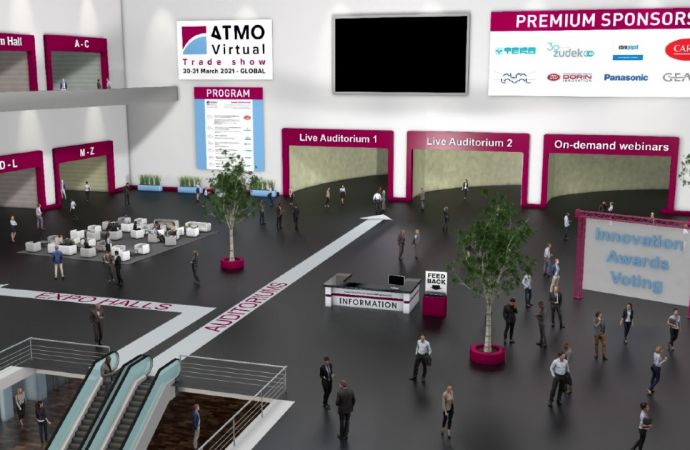As world leaders gathered in Paris for key climate talks in early December, Japan’s Ministry of Environment acknowledged the outstanding contributions of local manufacturers and end-users to the prevention of global warming, including Noritz Corporation for its revolutionary R290 domestic hybrid water heater; and convenience store giant Lawson for its work helping developing countries to adopt CO2 technology.

Over 173 applicants applied for the awards, which have been acknowledging leading companies’ efforts to undertake ‘global warming prevention activities’ since 1998. With the Ministry of Environment’s Tamayo Marukawa absent from COP21 in Paris, state minister Hiroshi Hiraguchi presented the winners, comprising 36 individuals and companies, with their awards during a ceremony at Tokyo’s Iino Hall & Conference Centre on 2 December, 2015.
Noritz Corporation was one of eight companies honoured with an award in the ‘Technology Development and Commercialisation’ category for its industry-first R290 (propane) household hybrid water heater and space heating system. In the International Contribution category, Lawson, Inc. received an award for its leadership in introducing CO2 refrigeration systems in Indonesia through the Joint Crediting Mechanism (JCM) project.
Several years of research leads to industry’s first R290 heat pump system
Toshihiro Hori from Noritz Corporation’s Alternative Energy Development Office was among 36 recipients to give a presentation about their initiatives to fight global warming at a forum following the ceremony.
The company’s journey, he stated, took several years, but the resulting technology is now achieving huge cost savings for customers.
“Amid the increasing need for further improvement of energy efficiency to combat global warming, Noritz spent four years in basic research, and another three years in product research and development,” Mr. Hori said. “Those years led us to successfully launch our environmentally-friendly water heater that successfully reduces the water heating cost by 60,000 yen per year.”
Behind this achievement was an ambitious challenge for Noritz, a manufacturer of gas water heater units, to develop a product that would work with an alternative natural refrigerant and rival the EcoCute, the pioneering heat pump technology using CO2 refrigerant that was first launched more than 10 years ago and has since sold over five million units on the Japanese market.
The award-winning hybrid water heater system has achieved a primary energy efficiency of 125%, while at the same time cutting down on CO2 emissions by 584kg per unit, approximately a 43% emission reduction annually compared to the company’s conventional units and 110kg less per unit than the EcoCute.
Hori says that the award means receiving official support from the government, which will help the company to further enhance its sales and appeal to a wider range of consumers. With the help of a dedicated team including a tireless group of young engineers, the company addressed the key challenge of cost reduction and strived to achieve specific numerical targets for energy efficiency improvements. Importantly, the team that initially researched the viability of R290 and conducted a number of pilot studies also took charge of product development.
As a result of its commitment to innovation, Noritz sparked significant change in the industry, demonstrating that not just CO2 but other natural refrigerants like R290 can now be seen as viable options for this application.
The company is already targeting the next stage of development, which will include further cost reductions and higher energy efficiencies to make their system more competitive with similar products from rival companies.
Lawson taking initiative to introduce CO2 systems in developing countries
For Lawson, it was the fifth time the company had received an MOE award. In 2013, Lawson was honoured in the category of ‘Countermeasure Technology Introduction and Dissemination’ for introducing CO2 refrigeration systems in its stores across Japan. This year, it won the award in the International Contribution category.
As part of an initiative to introduce CO2 refrigeration systems in developing countries, Lawson launched the project “Energy Saving at Convenience Stores in Indonesia” under the Joint Crediting Mechanism (JCM) in 2013, with a plan to fit 15 new stores in and around Jakarta with CO2 refrigeration units.
By adopting highly energy-efficient CO2 systems, the company set the goal of reducing annual power consumption for refrigeration by 14% compared to existing standard stores; and by combining these systems with energy-saving equipment for air conditioning and lighting, it also aimed to cut down on overall store energy use by 39,001kWh per year, which is equivalent to energy reductions of 21%.
In collaboration with its local retail partner MIDI, Lawson completed the installation of CO2 systems at 13 Alfamidi mini-supermarket stores in Jakarta at the end of March 2015. The refrigeration capacity of the new systems increased, and yet results thus far have also proved that they are effective in saving energy.
This project will continue until 2020, and Lawson plans to acquire carbon credits through the JCM scheme funded by the Japanese government. It also hopes to expand this initiative into other countries in South East Asia, where electricity prices are high, to help contribute to their economic development with advanced Japanese technology.
For more details about Lawson’s JCM project, see the first edition of Accelerate Japan August/September 2015.
Noritz Corporation was one of eight companies honoured with an award in the ‘Technology Development and Commercialisation’ category for its industry-first R290 (propane) household hybrid water heater and space heating system. In the International Contribution category, Lawson, Inc. received an award for its leadership in introducing CO2 refrigeration systems in Indonesia through the Joint Crediting Mechanism (JCM) project.
Several years of research leads to industry’s first R290 heat pump system
Toshihiro Hori from Noritz Corporation’s Alternative Energy Development Office was among 36 recipients to give a presentation about their initiatives to fight global warming at a forum following the ceremony.
The company’s journey, he stated, took several years, but the resulting technology is now achieving huge cost savings for customers.
“Amid the increasing need for further improvement of energy efficiency to combat global warming, Noritz spent four years in basic research, and another three years in product research and development,” Mr. Hori said. “Those years led us to successfully launch our environmentally-friendly water heater that successfully reduces the water heating cost by 60,000 yen per year.”
Behind this achievement was an ambitious challenge for Noritz, a manufacturer of gas water heater units, to develop a product that would work with an alternative natural refrigerant and rival the EcoCute, the pioneering heat pump technology using CO2 refrigerant that was first launched more than 10 years ago and has since sold over five million units on the Japanese market.
The award-winning hybrid water heater system has achieved a primary energy efficiency of 125%, while at the same time cutting down on CO2 emissions by 584kg per unit, approximately a 43% emission reduction annually compared to the company’s conventional units and 110kg less per unit than the EcoCute.
Hori says that the award means receiving official support from the government, which will help the company to further enhance its sales and appeal to a wider range of consumers. With the help of a dedicated team including a tireless group of young engineers, the company addressed the key challenge of cost reduction and strived to achieve specific numerical targets for energy efficiency improvements. Importantly, the team that initially researched the viability of R290 and conducted a number of pilot studies also took charge of product development.
As a result of its commitment to innovation, Noritz sparked significant change in the industry, demonstrating that not just CO2 but other natural refrigerants like R290 can now be seen as viable options for this application.
The company is already targeting the next stage of development, which will include further cost reductions and higher energy efficiencies to make their system more competitive with similar products from rival companies.
Lawson taking initiative to introduce CO2 systems in developing countries
For Lawson, it was the fifth time the company had received an MOE award. In 2013, Lawson was honoured in the category of ‘Countermeasure Technology Introduction and Dissemination’ for introducing CO2 refrigeration systems in its stores across Japan. This year, it won the award in the International Contribution category.
As part of an initiative to introduce CO2 refrigeration systems in developing countries, Lawson launched the project “Energy Saving at Convenience Stores in Indonesia” under the Joint Crediting Mechanism (JCM) in 2013, with a plan to fit 15 new stores in and around Jakarta with CO2 refrigeration units.
By adopting highly energy-efficient CO2 systems, the company set the goal of reducing annual power consumption for refrigeration by 14% compared to existing standard stores; and by combining these systems with energy-saving equipment for air conditioning and lighting, it also aimed to cut down on overall store energy use by 39,001kWh per year, which is equivalent to energy reductions of 21%.
In collaboration with its local retail partner MIDI, Lawson completed the installation of CO2 systems at 13 Alfamidi mini-supermarket stores in Jakarta at the end of March 2015. The refrigeration capacity of the new systems increased, and yet results thus far have also proved that they are effective in saving energy.
This project will continue until 2020, and Lawson plans to acquire carbon credits through the JCM scheme funded by the Japanese government. It also hopes to expand this initiative into other countries in South East Asia, where electricity prices are high, to help contribute to their economic development with advanced Japanese technology.
For more details about Lawson’s JCM project, see the first edition of Accelerate Japan August/September 2015.
MORE INFORMATION
Related stories



